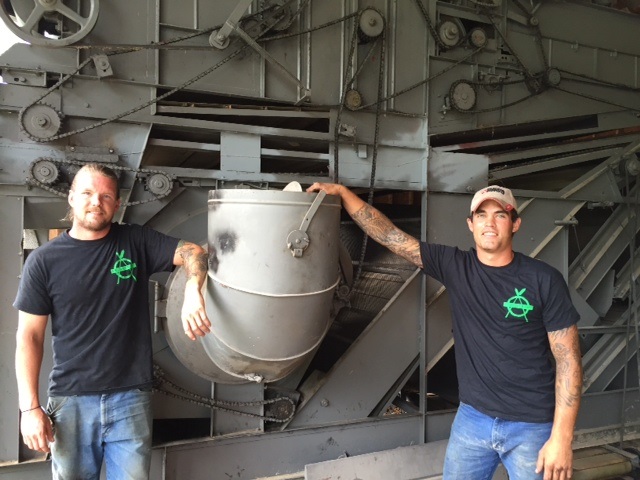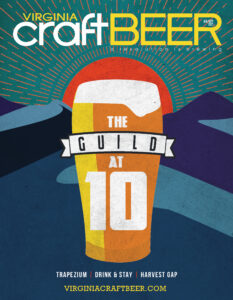By Steve Deason
First there was a distillery
If Jonathan Staples wanted to build a house he would first plant trees. This quip from a friend of Staples is recognition of his keen interest in the initial source of ingredients and the desire for them to be local. This way of thinking led Staples to purchase a distillery and is why he is now building a hop processing facility and brewery. Staples and or his wife Hilda Staples have been partners in many restaurants such as Volt, Family Meal, Graffiato and GWARbar. “When your wife owns restaurants you spend lots of time at the bar” says Staples. He found bartenders, like chefs, prefer to use quality local ingredients. There is often a local beer to offer but what about local liquor? From such thoughts came discussions with others about building a distillery. Staples said such conversations were wistful “like ones you have with your friends about opening a bar in Panama.”
While planning a trip to Richmond, Staples learned from his father that what was once the Cirrus Vodka Distillery was up for auction. Staples contacted friends Matt Brophy, Brewmaster and COO of Flying Dog Brewery, and Travis Croxton, co-owner of Rappahannock Oyster Company and related restaurants, to join him on the trip. After surprisingly winning the auction, Staples, Brophy and Kristi Croxton partnered to launch James River Distillery. Regulations forbid distillery owners from owning restaurants so Kristi’s husband Travis could not be a partner. Staples divested all his personal ownership in restaurants for this reason.
Dwight Chew, Head Distiller at James River, utilizes an alcohol vapor process to infuse flavor from a blend of botanicals for the distillery’s two gins. Commonwealth Gin, the distillery’s flagship, includes hops in the botanicals. With the desire to make Commonwealth Gin 100% Virginian, Staples researched hop supplies. Staples found that even with a hundred plus breweries in Virginia, hops production here is minimal. According to the growers organization USA Hops, Washington, Oregon, and Idaho represent over 97% of the 2014 commercial hop acreage in the United States. Staples explored growing hops for James River Distillery on a fifty-two acre horse farm he had purchased in Lucketts, Virginia. However, like other local hop farmers, he knew he would have no easy way to provide the hops year round without a nearby hop processing facility. With state and county grants and encouragement, Staples decided to build the first such facility in Virginia at the farm he renamed Black Hops.
Lucketts Mill & HopWorks
The Lucketts Mill & HopWorks processing facility and the organic hopyards at Black Hops Farm are managed by Solomon Rose and Dylan Krzywonski co-owners of Organarchy Hops. Organarchy Hops runs a fourteen acre organic hopyard in Maryland and offers design, construction and management services for other farmers. With Staples and lots of helpers, Rose and Krzywonski planted fifty-three hundred hop plants in early June on about six acres of the farm. Organic standards don’t permit the use of treated wood for trellises. Therefore the mature vines will be suspended by a steel trellis system instead. The ten thousand foot hop processing facility will be operational by the fall harvest. The facility is designed to process one hundred acres of hops but can handle fifty percent more with shift work. The small amount of hops currently grown in Virginia are mostly picked by hand, a tedious process that can take as much as a hundred man hours for a half acre. HopWorks imported a Wolf Harvester from Poland that can strip a half acre of hop vines in an hour! The facility also includes an oil fueled dryer, freezers, a pelletizer, and packaging equipment. Hops not sold immediately will be compressed into sixty or two hundred pound bales and stored in the freezers. When needed, they will be pelletized and packed in nitrogen flushed bags for preservation before shipment. Krzywonski and Rose are teaching other farmers in Virginia how to grow hops and offering their services in an effort to meet demand of the facility. The focus will be on growing aroma hop varieties. The flavor of these finishing hops can vary with growth location. Based on current partners, Krzywonski expects Lucketts Mill & HopWorks to process at least forty-five acres of Virginia Hops next year.
A Farm Brewery
Flying Dog Brewery announced in December that they would locate a brewery called Farmworks at the Black Hops Farm but withdrew from the project in June. Saying he had “planned to build a brewery before Flying Dog was involved,” Staples is finishing the work on a ten barrel brewery at the farm. He laments the loss of such a major brand name partner but is focused on finding a new head brewer and is excited about working from a “blank slate. We will have a concept more driven around agriculture (hops and other ingredients)” from the farm, rather than “a brewery that just happened to be on a farm.” Next to the brewery, Rose and Krzywonski have created a raised garden for herbs, spices, pumpkins and other flavoring ingredients. The brewery will be completed by the end of July. Unfortunately the brewery’s opening will be delayed until late fall due to restarting the federal permit process.
More Breweries, More Partners
Staples and Mike Van Hall, a former lawyer turned artist, operate Aid/Abet which assists in the launch of small breweries. Their first project, Pen Druid Brewing, is featured elsewhere in this magazine. Aid/Abet’s second project, Bulk Head Brewing Company, plans to open their taproom late fall in Columbia, Maryland. Josh Matthews, Bulk Head’s Founder, grew up in Virginia Beach where Staples spent his high school years. Bulk Head Brewing celebrates the surfing and skating world they both loved there. About these partnerships and others Staples emphasizes “Each of the things I do, the other guys are the main part of it… I am the supporting role, not the star. They might have done it without us; we would not have done it without them.”
Staples talks with excitement about things having gone “full circle” as Virginia embraces local restaurants and bars supplied by local farms, distilleries and breweries. He says in the past Virginia farmers made spirits to make their farms more profitable and now they can again. Due to such changes, a farmer can make a living with as little as ten acres of land, Staples asserts. If they share Staples and his partners fervor, they probably can. They may want to start with planting some trees.



